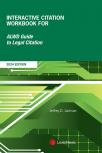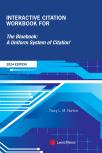Interactive Citation Workbook Professor Review Copies
Available in both Bluebook and ALWD versions, the Interactive Citation Workbook provides a self-paced, pedagogically sound, and stimulating way for students to learn citation. Individual chapters include explanatory text with examples, a checklist summary of the text, and a citation exercise for practicing and reinforcing the rules covered in the chapter.
Complimentary electronic copies of the widely-used workbook and Teacher’s Manual are available to professors for their review. Request access to these and other resources here. Plus we will work directly with your Campus Bookstore to ensure the best pricing. Once adopted, physical copies are available to you upon request.
Enhancements and exercises are updated annually. Each chapter includes introductory materials to explain and introduce new rules. Step-by-step explanations, alerts to common errors, and checklists aid students in understanding and applying style and usage guidelines correctly.
Students benefit from the combined use of the Workbook and Workstation by
- Questioning themselves while working through the citation of a case.
- Providing a checklist to make sure they do not miss any of the steps.
- Practicing in the workbook before providing answers on the Workstation
- Carrying any notes, guidance and answers written in the Workbook for future reference
View complimentary copies of ICW and the Teacher’s Manual today by requesting access here.
Learning citation is most effective when using both the ICW workbook and online workstation. The workbook uses a building block approach to learning citation while the online workstation features a faculty dashboard with an easy-to-use interface. Provide your students with additional context and assessment materials before walking into class.
View the Table of Contents and a Read Now sample by clicking on each title below.
The Bluebook A Uniform System of Citation is a registered trademark of The Columbia Law Review Association, Inc., The Harvard Law Review Association, the University of Pennsylvania Law Review, and The Yale Law Journal Company, Inc.
 Lexis Nexis
Lexis Nexis 

